Bonjour et bienvenue à I’d Like To Blank The Academy! We hopped back aboard the Martin Scorsese train for this post and watched his children’s adventure movie Hugo from 2011. Starring Asa Butterfield as an orphan looking to uncover the mysteries behind his late father’s automaton, Hugo winds its way through the streets of Paris and eventually becomes about much more than a creepy little robot that watches a child sleep. So grab your notebook and striped sweater and read on!
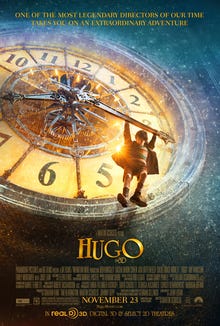
Previews
What, if anything, did we know about this coming attraction before we watched it?
Ellen: I want to say they mentioned this on Podcast: The Ride or something? This isn’t interesting, but I hope the movie is!
Tyler: Back when I was living in DC, I befriended a French guy who lived in my apartment building after he tried to flirt with my sister in the gym (while her boyfriend was right next to him, mind you; classic French overconfidence). One day while talking about movies and his acting ambitions (which for some reason took him to DC?), he told me an unbelievable (literally, in hindsight) story about how while living in Paris, he snuck into some fancy movie wrap party on his way back from the gym1 by convincing people he worked for the caterer. Then, the aspiring actor that he was, he shot his shot and walked right on up to Martin Scorsese (who directed the movie they were celebrating the completion of) and told him about his acting dreams.2 That movie was Hugo, thus concluding everything I know about Hugo.
Plots & Feelings
This one’s pretty self-explanatory.
Short Version (courtesy of IMDb): In 1931 Paris, an orphan living in the walls of a train station gets wrapped up in a mystery involving his late father and an automaton.
Long Version (modified from Wikipedia and formatted to fit your screen):
A view of complicated clockwork gears gives way to a view of the city of Paris, 1931. Our birds-eye view swoops through the city to the train station and eventually settles on the face of a great clock, through which we see a boy’s face peeking out from behind number 4! A tour through the station introduces us to some of our regulars, including: a surly toymaker, a lovely young florist, and a self-serious station inspector with a creaky leg brace. The boy, Hugo, can’t really be bothered with them because he’s busy bustling around the station’s various clockworks via chutes and ladders, maintaining the intricate mechanics. He takes a break to attempt to steal a mechanical rat right off the counter at the toy shop. The crotchety proprietor catches him immediately, and in making Hugo turn out his pockets, discovers he has a notebook containing plans and parts for a mechanical man. He confiscates the notebook and alerts the station inspector, so Hugo flees back into the walls.3
Tyler: Hugo always seems to look out of the number 4 in the clocks, even dangling near it in the movie poster. I wonder if there’s some significance there?
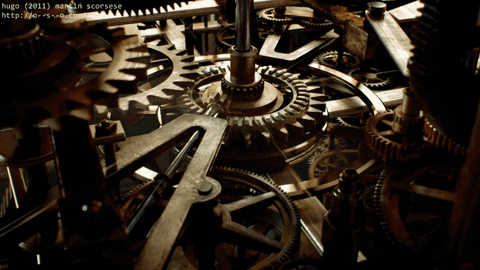
After clocking out for the day, Hugo returns to the toy shop and demands his notebook back. The man, Georges, instead threatens to burn it and walks out. Hugo follows him through the streets and snow of Paris to his home where Georges closes the door without looking back. Hugo manages to get the attention of a young girl, Isabelle, in the upstairs window. He once more demands his notebook and after arguing for a while, she promises to at least not let Georges, her godfather, burn it. Hugo returns to his home in the rafters of the train station and a terrifying metal automaton4. FLASHBACK: a much cleaner Hugo is being shown this automaton by his father, who works at a museum. He found it in the attic, and father and son embark on a montage to repair the writing robot, which has many strange and custom parts, such as a heart-shaped keyhole to wind it up. Tragically, a massive fire at the museum kills Hugo’s father before they can finish. Hugo’s drunkard of an uncle Claude begrudgingly takes him in to the train station where he manages the clocks. Claude now hasn’t been seen for months, but the clocks keep running.
Ellen: Apparently Claude adopted a “we don’t talk about Hugo” policy, because not a soul working at the station seems to know he’s there.
Tyler: I’m not saying I’d actually do it, but I understand the appeal of cashing a check by getting drunk while your nephew does all your work for you.
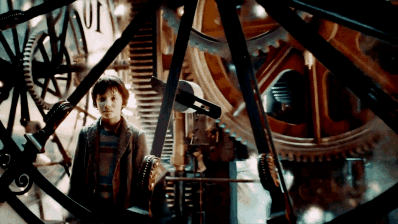
The next day, after Aladdin-ing himself a croissant and milk, Hugo returns to the toy counter to once again demand his book, because he’s never said “please” a dang day in his life. He’s handed a handkerchief full of ash.5 Isabelle leads him into the bookshop and explains that it was a trick, and the notebook is safe. It really upset her godfather for some reason, though. She recommends Hugo try again and be steadfast (girlfriend loves showing off her vocabulary). He does just that, and after a clockwork-rat-based entrance test, Georges offers to let Hugo work at the shop as recompense for his thievery. Hugo is very talented at this new job, and Georges even eventually starts showing Hugo card tricks and sleight of hand. He still can’t crack the code on fixing the automaton though. Luckily, Isabelle has never seen a movie, having been forbidden by her godfather, so Hugo has a cinema date to distract himself! Despite being a bookworm at heart, Isabelle is immediately in love with film, and Hugo reveals he also shared a love of movies with his father.
Ellen: A best picture nominee with a “love letter to the movies” subplot? Shocking.
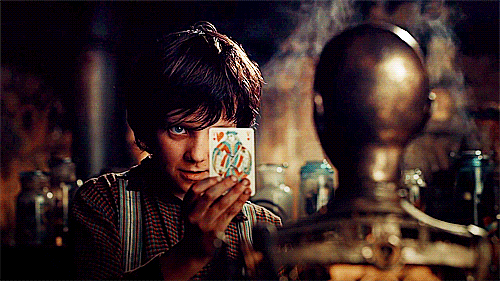
Back at the station, Isabelle’s quick thinking saves them from being booted to an orphanage by the overzealous station inspector, Gustave. The crowd of adults jostles the children, eventually dislodging Isabelle’s… heart-shaped key necklace! Despite his initial reluctance to show her where he lives, Hugo takes her up to the automaton. They wind it up and to their surprise, it draws! Hugo believed it would be a message from his late father, and in his mind, the picture confirms it. It depicts a rocket hitting the moon in the face, which is a scene from the first movie his dad ever saw, A Trip to the Moon. But wait: there’s more! The automaton signs “Georges Méliès”, aka Isabelle’s godfather! They go back to her house to investigate, but her godmother, Jeanne, shoos them away and says not to speak of it. They hide in a spare room as Georges comes home, only to discover a secret compartment in the armoire containing a box with Hugo’s notebook and Georges’ sketches. The drawings magically fly around the room until Georges and Jeanne burst in. She insists it’s his work, but he tears up the papers angrily and kicks Hugo out.
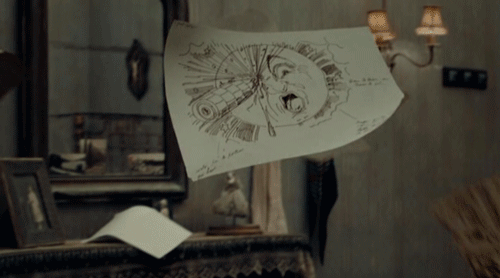
Those meddling kids get to snooping around The Film Academy Library. They find a book by René Tabard detailing the life, works, and death (???) of Georges Méliès after the Great War. Luckily, the author himself was roaming the library, and he takes them to see his collection of Georges Méliès memorabilia. The man made over 500 movies, but only one remains (naturally it’s A Trip to the Moon), and he was thought to be dead. The three movie buffs conspire to show very-alive Georges his remaining film. Hugo and Isabelle have a deep conversation about people having purpose the way machines do, and if they don’t have one, it’s like they’re broken. Perhaps it’s these melancholy thoughts that cause Hugo to dream of a horrific train derailment as the automaton watches him sleep! He wakes with a start, only to hear a sinister ticking coming from his heart, and he’s the automaton!! He wakes again. Oh yeah, and Uncle Claude’s body is found in the river. Zoinks, I wonder how the train station’s clocks have kept running?
Tyler: Yeesh, as if the image of the automaton watching Hugo sleep wasn’t creepy enough.
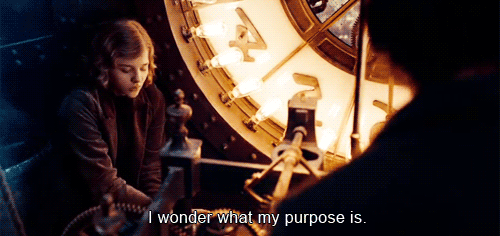
Jeanne lets the trio into the house after René recognizes her as the star of many of Georges’ films. They begin their A Trip to the Moon watch party, and by the end Georges is standing in the doorway, ready to tell his tale. He started as a stage magician with a workshop in his theater where he could create his own inventions, such as automatons. At a circus, he saw his first motion picture in a sideshow tent, and sold everything he had to open a movie studio. Using cameras of his own design, he made a new kind of magic with his Star Film Company. When the war came, however, tastes changed, and he was forced to close his studio and sell all his films. He donated the automaton to a museum that burned down, and Hugo realizes it’s the one he repaired! He rushes to get it, but immediately gets got by Gustave! Hugo is thrown in a cage while the inspector calls to get an orphanage to pick him up, but our little trickster has lockpicking tools on hand and escapes! A mad dash through the station and the inner workings of the clocks leads to Hugo hanging on the outside face of the clock tower to hide. He eventually makes it back downstairs, but drops the automaton on the tracks. He and the robot are rescued by Gustave, and Georges walks up and says, “This boy belongs to me.”
Ellen: So like… I feel like the trauma doesn’t justify the behaviors here. I get that Georges had his world and purpose in life shaken up, but he is so mean to this child. I myself complained about how Hugo is rude, but still: a child!
Tyler: Spoiler alert for Wiki-Wiki-Whaaat? but this is another example of how you can really tell the source material was a children’s book. All of Georges’ actions are simplistic and dialed up to eleven (Ben Kingsley sure overacted his heart out to reflect that), lacking any sort of nuance or rational justification.
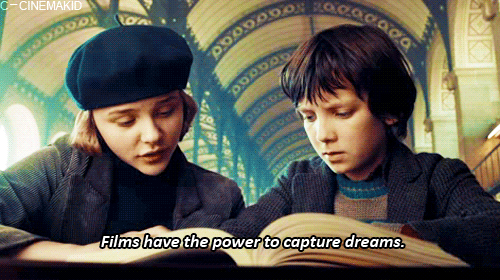
Some time later, Georges has been named a professor at the Film Academy, and he’s being honored with a film showcase curated and recovered by René. We see a supercut of his films and boy - that man loved a skeleton! At a reception, our cast of characters mingles happily, with Hugo practicing card tricks and even Gustave showing off the new leg brace the kid made for him. Isabelle curls up in an armchair in the corner and begins to write.
Tyler: We also see an extended shot on the automaton, long enough that I was half-expecting it to wink at us or something, which would have lived rent-free in my nightmares forever.

Intermission
Even though ILTBTA is free, please indulge us further and enjoy this quick “advertisement.”
This installment of ILTBTA is brought to you by … Georges' Toy Store!
Have the drudgeries of modern day Paris got you down? Feeling like you’ve lost your sense of childlike wonder on your daily commute at the train station? Let your inner grouchy child free at Georges’ Toy Store! With a fine collection of clockwork trinkets and stage magic oddities, you’ll feel the whimsy wash back over you.
Tell Georges that ILTBTA sent you and get 27% off your next purchase, and he’ll throw in some ashes of a child’s notebook for free!
Georges’ Toy Store: it’s a clockwork galore-nge in here!
Wiki-Wiki-Whaaat?
Love a good Wikipedia rabbit hole in search of some fun facts? Us too.
Hugo’s Wikipedia page has some interesting facts and anecdotes that we recommend you read through, but here are a few of our favorites:
Hugo is based on The Invention of Hugo Cabret, a 2007 picture book written and illustrated by Brian Selznick. Selznick, whose grandfather was a cousin of famous Hollywood producer David O. Selznick, also illustrated the 20th anniversary editions of the Harry Potter books.
Tyler: Speaking of Harry Potter, a speaker at a work conference I was at recently showed a picture of JK Rowling, hoping to use her as an example of someone who persevered despite being told no many times. Unfortunately, when she asked the audience what we knew about her, many people yelled “She’s canceled!” to the surprise of the presenter, who clearly knew nothing about her controversial comments about trans people. It was like someone showed a picture of Donald Trump hoping people would only recognize him as the host of The Apprentice. Moral of the story: do your research people!
Hugo’s nightmare of a runaway train was inspired by a real-life train derailment in 1895 at the station Hugo lives in.
While much of Hugo’s depiction of Georges Méliès was true (his magic and toy making roots, interest in automata, toy sales in a train station, and eventual widespread recognition), it did not mention his first wife or children. After refusing his family’s wishes to marry his brother’s sister-in-law, Méliès instead married Eugénie Génin, a family friend with whom he had two children.
Hugo actor Asa Butterfield’s full name is (according to Wikipedia) Asa Bopp Farr Butterfield. Bopp is in reference to a comet that apparently flew by when he was born.
Tyler: When I poke a dog’s nose with my long arms, I bop far.
Hugo apparently went about $60-70 million over budget, causing producer Graham King to say: “Let's just say that it hasn't been an easy few months for me—there's been a lot of Ambien involved.” Unfortunately, the movie made “only” $186 million on its roughly $160 million budget. After all other costs are considered, it reportedly lost $100 million.
Oscar NomNomNomz
Since we all know a movie is nothing without the food and drink it incorporates.
It’s now time to award the Oscar for Best Snacktor in a Supporting Role.6 And the nomnomnominees are:
A fresh stolen croissant from the train station
An attempted stolen pastry
Popcorn at le cinema
And the Oscar goes to … popcorn at le cinema! Unfortunately, we have subsequently salted, buttered, and ate the popcorn, so we will savagely accept this award on its behalf.
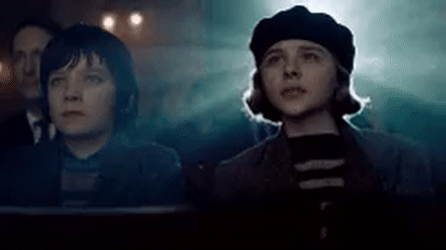
Fill In The Blank
How did we really feel about The Academy nominating this?
Ellen: I’d like to send the Academy to the movies without popcorn so they really have to think about it. From a plot perspective, this movie is Ellen-bait: gears and building things, movies, stage magic, all wrapped up in a period piece. And yet… it just didn’t work for me. I think there are two reasons: characters and execution. Being invested in this movie requires you rooting for Hugo, and while I of course want better for him, his whole manner is not endearing. He just demands stuff from people and has an unfriendly demeanor. The tone of it is also not quite there. It’s out of Martin Scorsese’s wheelhouse as far as I can tell. I don’t want to say directors should never do something different, but I feel like some unfamiliarity with levity showed. It was someone trying on whimsy as a hat rather than someone who fully embraces it. I agree with Tyler: in the hands of an unknown director, this doesn’t get nominated, despite an interesting plot and some truly spectacular individual shots.
Tyler: I’d like to ask the Academy to rewatch Hugo and forget about who the director is. I know Academy voters can’t help but nominate some of their favorite directors, especially when they make movies that are backdoor ones about the power of the cinema and filmmakers, but I don’t think Hugo gets nominated if director John Doe made it instead of a legend like Martin Scorsese. That’s not to say it wasn’t a cute movie, but it almost seemed to be half-whimsical, whereas I prefer a Wes Anderson-esque commitment to the whimsy (hence this post’s subtitle). And (channeling my inner senior citizen) despite only being two hours, this felt like it had some serious filler and could’ve been a bit shorter and tighter overall.
Let The Credits Roll
Thanks for reading! Some quick housekeeping as you exit the theatre:
If you have plots and feelings of your own (on the movie or ILTBTA in general), feel free to comment on the post or simply reply to the email. If you liked reading this: tell your friends! If you hated reading this: tell your friends how much you hated it by forwarding it to them!
If you’re a weirdo like Tyler and use Twitter, feel free to follow us there @BlankTheAcademy for ILTBTA updates, rejected jokes, and other random movie-related musings. Once we reach a million followers, we’ll offer to purchase the @ILTBTA handle from the butthead who snagged it before us.
If you’d like to start a wild Best Picture journey of your own, feel free to download a copy of The Spreadsheet. Bonus: checking off the boxes is oddly satisfying.
Post-Credits Scene
Get a sneak peek at the next ILTBTA installment.
For our next post, ILTBTA will jump to another legendary director and punch its Hitchcock ticket with 1940's Foreign Correspondent. Available for free with an HBO Max subscription, Foreign Correspondent is a spy thriller starring Joel McCrea as an American journalist in Great Britain who uncovers a secret spy ring.
Until then, don’t forget to wish ILTBTA a happy birthday tomorrow!
Ellen: Why does it sound like all of this dude’s interactions are gym-based?
Marty was apparently very supportive.
Big The Borrowers energy.
Sounds like my ex-wife!
Tyler: Real or not, this is an absolutely SAVAGE thing to do to a child.
Results tabulated and certified by the accountants at Ernst & Yum™.




